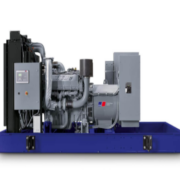What is diesel generator and how to collect a genset
A generator set – sometimes called ‘ a genset’ is a unit of equipment built up of an engine, an electric generator (alternator) to generate electrical energy from a fuel. In this case we are looking at a diesel form of engine-generator where diesel compression-ignition engine built to run on diesel fuel, they are relied upon by many businesses and other organisations to supply the electrical power they need during cuts, brownouts, or any other interruption to mains power, they can also be used as a continunous power source for many other applications including, events, powering off-grid homes and much more. There are many different types and configurations of generators, but they all work essentially the same way, and have the same core components.
Diesel generators are very useful machines that produce electricity by burning diesel fuel. These machines use a combination of an electric generator and a diesel engine to generate electricity. Diesel generators convert some of the chemical energy, contained by the diesel fuel, to mechanical energy through combustion.
How does a diesel generator work?
First, air is blown into the generator until it is compressed;
Subsequently, diesel fuel is injected;
The combination of these processes, air compression and subsequent injection of the fuel, will contribute to generate the (intense) heat that triggers the inflammation of the fuel. In this way, it starts combustion and causes the generator to start up.
Thus, the generator starts to produce the necessary electrical energy to be distributed according to the needs of the equipment connected to it or the place / space that it will supply.
The main parts of a Diesel Generator
Every diesel generator is made up of at least nine different – but equally important – parts. These are the:
- Diesel Engine
- Alternator
- Fuel System
- Voltage Regulator
- Cooling System & Exhaust System
- Lubrication System
- Battery Charger
- Control Panel
- Main Assembly Frame or Skid
Engine
Being the primary component of the diesel generator set, the engine supplies the mechanical energy which is later transformed into electrical power. As a matter of fact, the power output of these diesel generators is directly proportional to its engine’s size.
Alternator
This is another key component of a diesel generator that uses the mechanical input supplied by the engine and converts it into electrical output. An alternator includes a rotor that produces a magnetic field to eventually generate some alternating current. This is why the rotor is referred to as the main part of the alternator.
Fuel System
This component stores and supplies the fuel to the generator. In general, a fuel system can easily keep a 62.5KVA silent generator running for about 6 to 8 hours.
Lubricating System
This unit ensures the smooth functioning of different parts of a diesel generator. This is why it is recommended to keep a proper check on the lubricating system of the generator to avoid any malfunctioning.
Control Panel
This unit not only includes the Start/Stop button but also contains indicators for various parameters like current, voltage, and frequency. You can easily operate your 2.5KVA portable generator through its control panel.
Advantages of diesel generator
The diesel engine is much more efficient and preferable as compared with gasoline engine due to the following reasons:
- Modern diesel engines have overcome disadvantages of earlier models of higher noise and maintenance costs. They are now quiet and require less maintenance as compared with gas engines of similar size
- They are more rugged and reliable
- There is no sparking as the fuel auto-ignites. The absence of spark-plugs or spark wires lowers maintenance costs
- Fuel cost per Kilowatt produced is thirty to fifty percent lower than that of gas engines
- Gas units burn hotter than diesel units, and hence they have a significantly shorter life compared with diesel units
- Safe storage: Diesel fuel is much safer to store than other types of fuel, like gasoline, which is extremely explosive and would ignite easily if it were to spill. While still flammable, diesel carries a much lower risk for igniting. It also has a longer shelf life than gasoline, so you will get a better-quality fuel from your stored supply.
- Continuous power supply: When you do experience a blackout, a well-maintained diesel generator can prove very reliable and keep your critical power systems running for long periods of time. This will keep downtime to a minimum so that your facility doesn’t experience significant financial losses while you’re waiting for the power to return.
- Power output: Diesel generators are capable of handling larger power loads and will run for longer durations than other types of generators available. This makes them a perfect choice for remote sites where the power grid might be unreliable.
- Power output: Diesel generators are capable of handling larger power loads and will run for longer durations than other types of generators available. This makes them a perfect choice for remote sites where the power grid might be unreliable.
- Power output: Diesel generators are capable of handling larger power loads and will run for longer durations than other types of generators available. This makes them a perfect choice for remote sites where the power grid might be unreliable.
power of diesel generator
When a diesel genset operates under the conditions for which it was designed, it has a higher efficiency and longer service life. However, it is important to understand the difference between kilowatts (kW), kilovolt-amperes (kVA) and power factor (PF):
Kilowatts (kW) are used to measure the real electric power provided by the generator, which is used directly by appliances and equipment in the building.
Kilovolt-amperes (kVA) measure the apparent power. This includes real power (kW), but also reactive power (kVAR) drawn by devices like motors and transformers. Reactive power is not consumed, and instead it cycles between the power source and the load.
Power factor is the ratio between real and apparent power. If a building consumes 900 kW and 1000 kVA, the power factor is 0.90 or 90%.
Diesel generator nameplates have rated values for kW, kVA and PF. However, the operating conditions are determined by the connected load, and not by the generator. To make sure your building has the right genset, the best recommendation is having the unit sized by professional electrical engineers.
It is important to know the requirement of the home/enterprise before buying a diesel generator. According to the need of a place, generators ranging from 2.5 kVA to more than 2000 kVA can be used.
Phase
Diesel generators are available for both single phase and three phase connections. Find out if your home/enterprise has a single phase or three phase connection and choose a suitable generator accordingly.
Fuel Consumption
Fuel consumption is one of the most important things to be kept in mind while buying a diesel generator. Find out the fuel consumption of the generator per hour and per kVA (or kW) and also the fuel efficiency it provides with respect to the load.
Portability and Size of diesel generator
A generator with a set of wheels or those provided with slots for easy lifting helps reduce the hassle of transportation. Also, keep in mind the size of the generator with respect to the space available to keep it.
Noise
High noise emission can be a problem if the generator is kept in close proximity. Noise absorption technology is provided in some diesel generators which highly reduces the noise emitted by it.





